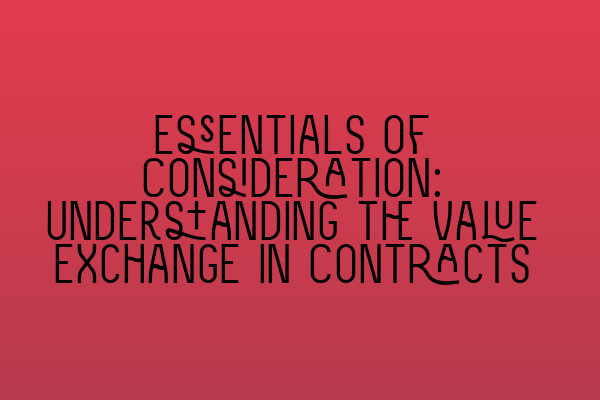Essentials of Consideration: Understanding the Value Exchange in Contracts
Welcome to SQE Contract Law, where we provide expert guidance on all matters related to commercial contracts. In this article, we will delve into the essential concept of consideration in contracts and its significance in determining the enforceability and validity of an agreement. Whether you are a solicitor, law student, or a party to a contract, understanding the value exchange is crucial in protecting your legal rights.
What is Consideration?
Consideration is one of the fundamental elements required for the formation of a valid contract. In simple terms, it refers to the exchange of something of value, whether it be goods, services, or a promise to do or refrain from doing something. Both parties involved in the contract must give and receive consideration to create a legally binding agreement.
Consideration is what distinguishes a contract from a gift or a voluntary promise. It ensures that each party has a stake in the agreement and prevents situations where one party can later renege on their obligations without consequence.
The Significance of Consideration
Consideration serves several important functions in contract law:
- Enforceability: A contract lacking consideration is generally considered to be a mere promise, which is not legally binding. The presence of consideration ensures that the parties intended to be legally bound by their agreement.
- Mutuality: Consideration ensures that both parties to a contract have something to gain or lose. It establishes a mutual obligation between the parties and protects against one-sided agreements.
- Price Determination: Consideration helps determine the value of the contract. It helps establish the cost of goods or services exchanged and provides a framework for assessing damages in the event of a breach.
Understanding the role of consideration is paramount in contract drafting and negotiation. It is essential to define and clearly specify the consideration each party is providing to avoid any ambiguity or misunderstandings that could potentially lead to legal disputes.
Exceptions to the Requirement of Consideration
While consideration is generally required for a contract to be legally enforceable, there are certain exceptions to this rule:
- Deeds and Promissory Estoppel: Contracts executed as deeds and promises made under promissory estoppel do not require consideration. These exceptions arise in specific situations where fairness and equity demand protection despite the absence of consideration.
- Charitable Contributions: Contracts involving charitable contributions are also exceptions to the requirement of consideration. However, public policy and legislation often regulate such agreements to ensure they are made in good faith.
It is crucial to consult with an experienced solicitor to determine the applicability of these exceptions and ensure compliance with all relevant legal requirements.
Conclusion
In summary, consideration is the essence of a contract, representing the value exchanged between the parties involved. It plays a vital role in establishing the enforceability, mutuality, and price determination of the agreement. Understanding the significance and exceptions to the requirement of consideration is fundamental in creating and enforcing contracts that protect your legal rights.
If you would like further assistance or guidance on contract law or other legal matters, please do not hesitate to contact our expert solicitors at SQE Contract Law. You may also find the following articles helpful:
- Barrister vs. Solicitor: A Comprehensive Comparison
- Understanding the SRA Competence Statement: A Guide for Solicitors
- Exploring Different Solicitor Specializations: Finding Your Niche
- Top Recommendations for Law Schools in the UK
Thank you for choosing SQE Contract Law as your trusted legal resource. We look forward to assisting you with any legal needs you may have.
